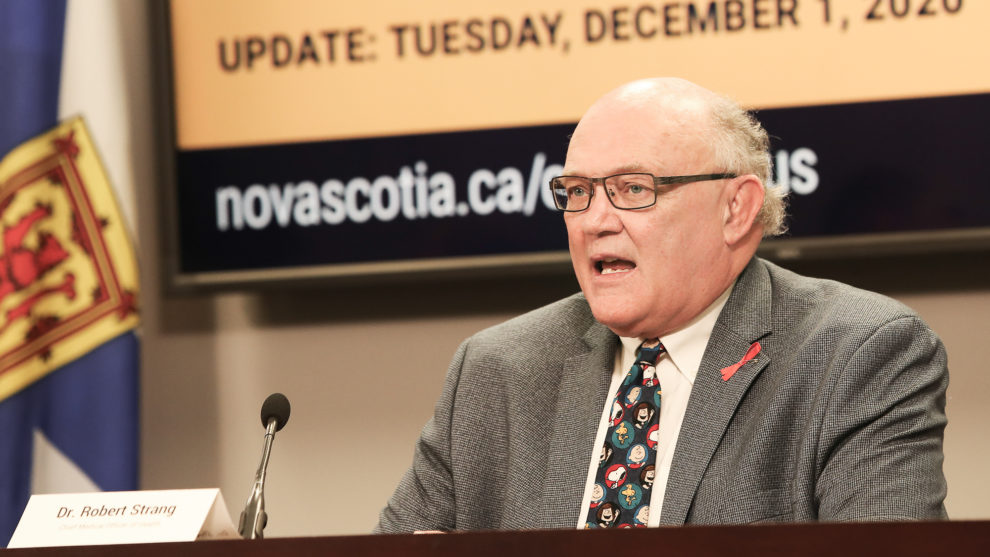COVID-19 variants found in Nova Scotia
Province maintains state of emergency but eases some restrictions on sports, performances

caption
Chief Medical Officer of Health Dr. Robert Strang speaking at a COVID briefing on Dec 1, 2020.Two previous cases of COVID-19 were new variants of the contagious disease, but Nova Scotia’s chief medical officer of health says there was no community spread.
“The variants don’t require us to do really anything different in Nova Scotia,” Dr. Robert Strang said during Friday’s media briefing.
“They’re just a reminder of how we have to stay strong and vigilant and do what we’re already doing.”
Premier Stephen McNeil said samples sent to the National Microbiology Laboratory in December found one case of the UK variant and one of the South African variant. He said the two people isolated at the time and their cases are considered resolved. Related stories
The UK variant ( B.1.1.7) of COVID-19 may be more deadly, according to recent reports, but that is still under investigation.
Both December cases were related to international travel.
“Neither case resulted in spread into the community, but in one of the cases household members were infected,” Strang said, adding there was no spread beyond that household.
Gathering limits increased for sports, performances
McNeil announced four new cases of COVID-19 on Friday, bringing the total number of active cases in the province to 22.
The state of emergency will be renewed on Monday and remain in place until Feb. 7. All current restrictions will remain in place, but with two new exceptions.
Starting Monday, gathering limits for performing arts and sports will be increased from 25 to 50 without need for physical distancing. Classes, rehearsals and virtual performances for those in the performing arts will be allowed to resume under the new 50-person gathering limit.
Those competing in team sports like hockey will be able to play against teams they regularly compete against. These same rules apply to meets for individual sports like archery. Tournaments that bring athletes from multiple regions together are not permitted.
Spectators will not be allowed to attend practices, rehearsals, performances or competitions.
“We recognize the importance of sports, arts and culture for physical and mental health, and we are opening those opportunities somewhat, but we’re not able to introduce crowds or spectators into those opportunities at this point,” Strang said.
Also starting Monday, adult service centres and regional rehab centres will be allowed to get residents back in the community for work and volunteering.
Vaccine timelines
Like in the rest of Canada, the Pfizer-BioNTech COVID-19 vaccine shortage will be felt in Nova Scotia. The province will not receive new doses of the vaccine next week, but expects a limited number to arrive in the first week of February.
The province will receive a shipment of the Moderna vaccine in the first and last week of February, and delayed doses of Pfizer are likely to arrive in either late February or early March.
McNeil said the government will “ensure those who have had their first dose that they will have their second shot.”
Strang said the province is “looking to continue, as much as possible, vaccination in all sites. Some we may need to decrease the numbers, decreasing the hours, but we want, as much as possible, to have all our current sites operating as much as they can.”
As of Thursday, 10,575 doses of vaccine had been administered — 2,705 of those were second doses.
About the author
Alec Martin
Alec (they/them) is a journalist based in Halifax, with a focus on music and arts. Their work has appeared in The Coast and they are a member...
